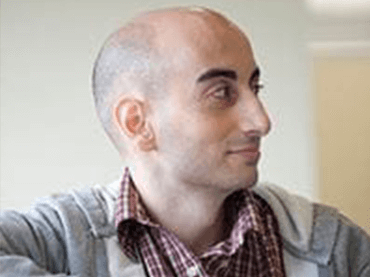Kyriako Damavoletes has HbS beta thalassemia. This means he received a HbS gene from one parent and a beta thalassemia gene from the other.
Both Damavoletes and his younger sister have HbS beta thal.
He knew he was different by about age 4 or 5, but it wasn’t until middle school that he truly understood the impact the disease would have on his life.
“At about age 12 or 13, I realized this disease would carry a lot of weight in my life. I saw my older siblings driving and getting ready for college. I thought to myself, ‘Am I going to be able to get a license, go to college, have a job? Like everyone else?’ I just wanted to have the chance others had.”
All grown up now, with an education and license to drive, Damavoletes works in the field of information technology.
Sickle Cell Disease and Health-Based Discrimination
Damavoletes shares some telling stories about how sickle cell disease has resulted in problems in his career.
“I told my manager at one job that I had sickle cell disease and that I was experiencing a pain crisis that may keep me out for a few days. Without blinking an eye, she said that my health issues were causing an inconvenience and that she was going to have to rethink my contract.
“My supervisor at another job really fit the definition of the word jerk. He was very invasive and asked all manner of personal questions about my condition. Every time I had to be out — which wasn’t really all that much — he wanted detailed specifics about what happened, where I received care, what the doctors prescribed, and more. It really made me feel uncomfortable.
“Also, when concerned co-workers would inquire about how I was doing, my supervisor would take me aside and order me to stop ‘whining about my condition to my co-workers.’ I never complained to my co-workers, but they could tell when I felt bad and knew I had sickle cell.”
Damavoletes purposely does not apply to jobs where his position would carry too much weight.
It’s not that he’s not willing to do the work; it’s simply that he does not want his absences to adversely affect the performance or success of others on his team.
He’s also careful not to take positions that require travel, since air travel could prove dangerous for him.
Stigma of Sickle Cell Disease
The stigma of sickle cell disease is strong and patients suffer because of it.
Damavoletes observes that many health care professionals don’t understand the specifics of the disease and the special pain management needs of sickle cell patients.
“My frequent everyday pain episodes have caused me to build up a tolerance to the common pain medications prescribed in a hospital setting. This means that, when I do show up at the emergency room (ER) with a pain crisis, I need a larger dose than the typical trauma patient to control my pain. You’d be surprised how many doctors just don’t understand that.”
He realizes that physicians working in the ER must watch out for drug-seeking behavior and take care not to prescribe too high a dose of these powerful medications to patients. But, he says, even when he tries to explain that he has built up a tolerance due to sickle cell disease — and asks them to verify this with his physician — they usually do not listen.
This results in much unnecessary suffering for him and, ostensibly, other patients in his position.
It’s humiliating for Damavoletes and other sickle cell patients when ER doctors and other health care workers look at them as common narcotic drug seekers, especially when all it would take is a quick review of the electronic records on file to verify their status.
Damavoletes offers a solution
Damavoletes suggests,
“Perhaps we could carry an identification card of sorts, similar to those that diabetics or epileptics carry, that verify sickle cell disease status and include a number to call for details.”
Although every hospital would carry the responsibility to decide whether or not to participate in a sickle cell disease identification card program, the idea has promise for sickle cell disease sufferers.
What do you think?
Get involved with Ryan Clark’s Cure League and share your ideas for solutions to this and other problems faced by those with inherited blood disorders.
Expertise in Sickle Cell Care
At the UPMC Adult Sickle Cell Disease Program in Pittsburgh, PA, our dedicated health care team has expertise in managing complex genetic blood diseases.
Our goal is to help our patients manage their disease so they can have a better quality of life.

















